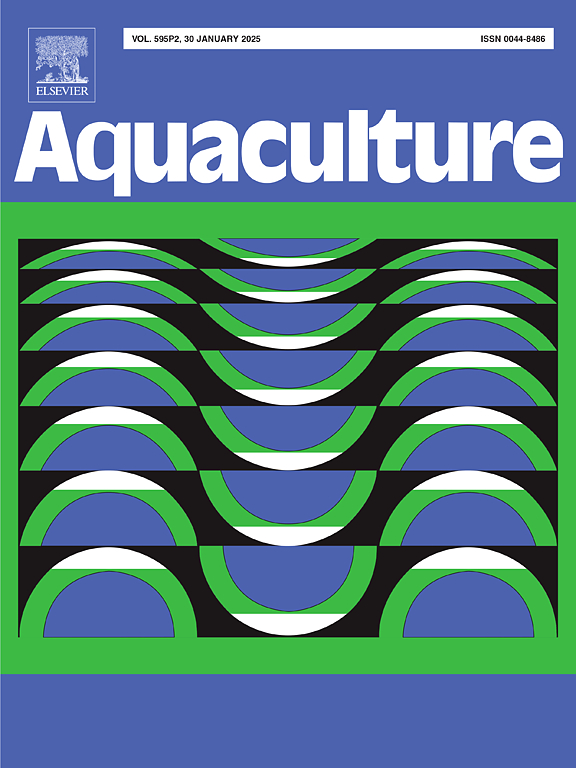Effect of algal extracts on the metabolism, intestinal functionality and oxidative status of gilthead of seabream (Sparus aurata)
IF 3.9
1区 农林科学
Q1 FISHERIES
引用次数: 0
Abstract
Intensive aquaculture systems are associated with decrease in water quality and increased environmental stress and disease prevalence. This promotes the exploration of bioactive compounds that can be included in aquafeeds to enhance fish resilience under such negative conditions. The present study investigated the effects of dietary supplementation with two different extracts obtained from the green seaweed Ulva spp. on the growth performance, intestinal functionality, metabolic profile and oxidative status of gilthead sea bream (Sparus aurata). These extracts, either characterized to be enriched in protein (P) or carbohydrate (F) fractions, were included at 12 % in respective diets. After a 42-day feeding trial, a 10-day starvation challenge was conducted as a putative proof-of-concept on the effects of bioactive compounds under food-deprivation. No significant differences in growth performance were observed between the experimental groups during the feeding period. However, after starvation challenge, fish fed the Ulva-based diets exhibited reduced weight loss (∼5 % lower than the control group), indicating enhanced physiological resilience. No significant effect of the inclusion of algal extracts was observed on intestinal morphology or functionality. Biochemical analyses revealed that plasma lactate levels were significantly lower (∼15 %) in the P group, while plasma protein concentrations were reduced (∼9 %) in the F group compared to the control. Hepatic glycogen depletion was more pronounced in fish fed both supplemented-experimental diets after the starving period. Conversely, oxidative stress markers indicated enhanced antioxidant capacity in both experimental groups. Superoxide dismutase (SOD) activity was significantly higher (∼13 %), while malondialdehyde (MDA) levels, a marker of lipid peroxidation, were ∼ 15 % lower in Ulva-fed fish compared to controls. These findings suggest that Ulva spp. extracts may confer metabolic and antioxidant benefits, particularly under starvation-induced stress, without compromising growth performance. Further research is warranted to optimize inclusion rates and elucidate their long-term impacts.
海藻提取物对海鲷(Sparus aurata)代谢、肠道功能和氧化状态的影响
集约化水产养殖系统与水质下降、环境压力增加和疾病流行有关。这促进了对生物活性化合物的探索,这些活性化合物可以包含在水产饲料中,以增强鱼类在这种消极条件下的恢复能力。本试验研究了在饲料中添加两种不同的绿海藻提取物对黄颡鱼(Sparus aurata)生长性能、肠道功能、代谢特征和氧化状态的影响。这些提取物的特点是富含蛋白质(P)或碳水化合物(F),在各自的饮食中以12%的比例添加。在42天的饲养试验后,进行了10天的饥饿挑战,作为对食物剥夺下生物活性化合物影响的假定概念证明。饲喂期各试验组间生长性能无显著差异。然而,在饥饿挑战后,喂食基于ulva的饲料的鱼表现出体重减轻(比对照组低~ 5%),表明生理弹性增强。未观察到藻类提取物对肠道形态和功能的显著影响。生化分析显示,与对照组相比,P组血浆乳酸水平显著降低(~ 15%),而F组血浆蛋白浓度降低(~ 9%)。在饥饿期后,用两种补充实验饲料喂养的鱼肝糖原消耗更为明显。相反,氧化应激标志物表明两个实验组的抗氧化能力都有所增强。超氧化物歧化酶(SOD)活性显著提高(~ 13%),而丙二醛(MDA)水平(脂质过氧化的标志)与对照组相比降低了~ 15%。这些发现表明,Ulva植物提取物可能具有代谢和抗氧化的益处,特别是在饥饿诱导的应激下,而不会影响生长性能。有必要进一步研究以优化纳入率并阐明其长期影响。
本文章由计算机程序翻译,如有差异,请以英文原文为准。
求助全文
约1分钟内获得全文
求助全文
来源期刊

Aquaculture
农林科学-海洋与淡水生物学
CiteScore
8.60
自引率
17.80%
发文量
1246
审稿时长
56 days
期刊介绍:
Aquaculture is an international journal for the exploration, improvement and management of all freshwater and marine food resources. It publishes novel and innovative research of world-wide interest on farming of aquatic organisms, which includes finfish, mollusks, crustaceans and aquatic plants for human consumption. Research on ornamentals is not a focus of the Journal. Aquaculture only publishes papers with a clear relevance to improving aquaculture practices or a potential application.
 求助内容:
求助内容: 应助结果提醒方式:
应助结果提醒方式:


